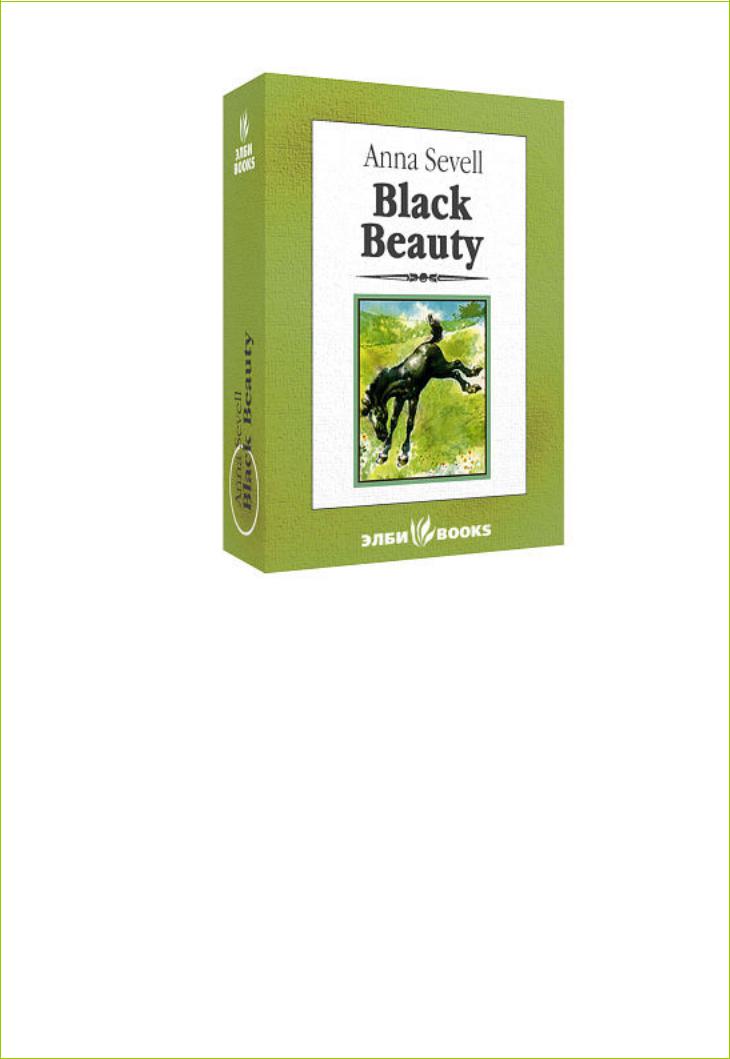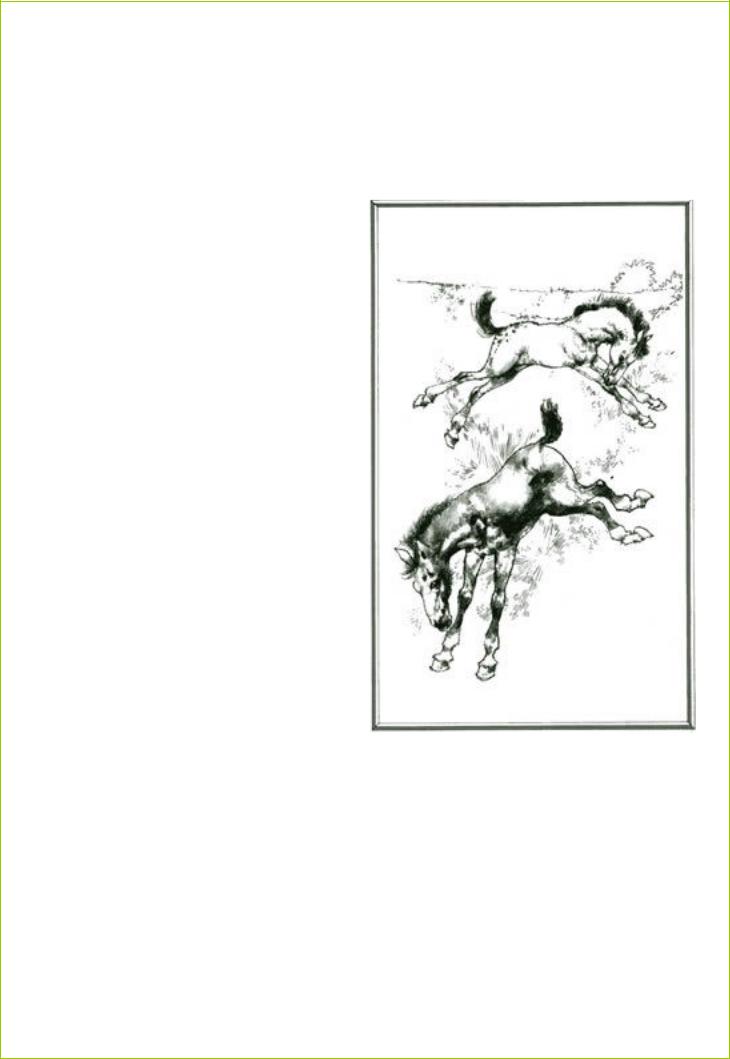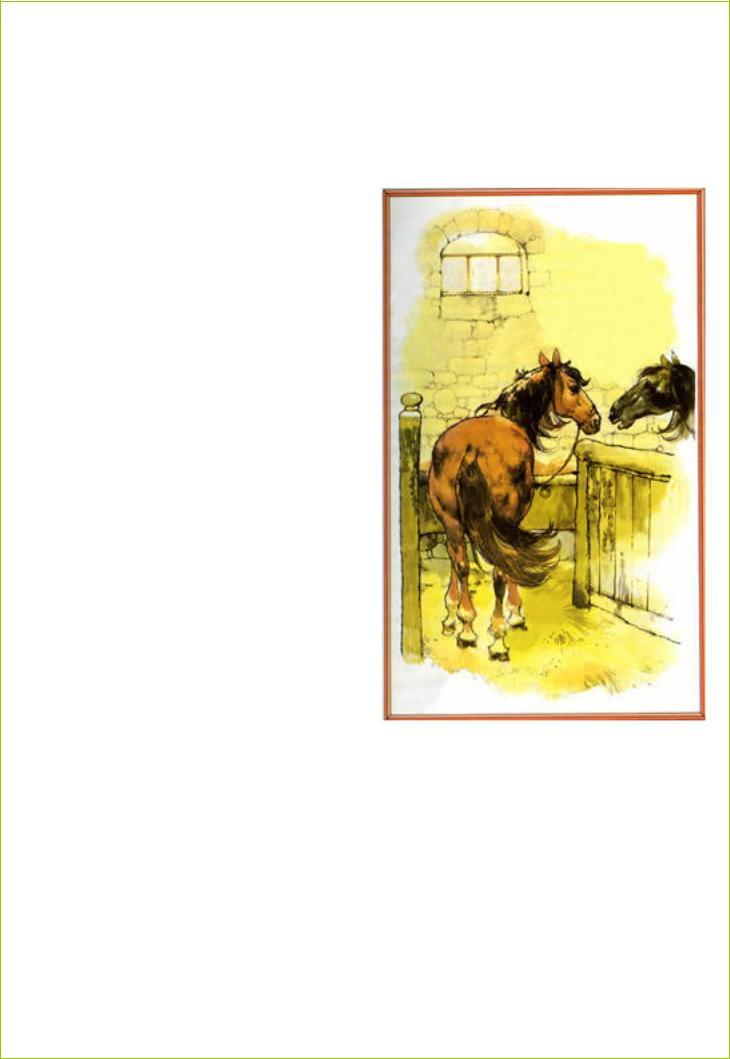
black_beauty
.pdf
*******
Художественное оформление обложки книги:
Ольга Сухова
www.business-lady.com – «Электронный Бизнес в Интернет»
Верстка текста и оформление книги:
Татьяна Герасименко
www.englishforkids.ru – «Английский язык для детей»
*******
1

Black Beauty
Contents
Introduction |
3 |
||
1 |
My mother |
4 |
|
2 |
Learning |
6 |
|
3 |
Birtwick Park |
8 |
|
4 |
I begin well |
10 |
|
5 |
My new friends |
12 |
|
6 |
James Howard |
13 |
|
7 |
The fire |
15 |
|
8 |
Little Joe Green |
17 |
|
9 |
Going for the doctor |
18 |
|
10 |
Mrs Gordon is saved |
20 |
|
11 |
Another move |
22 |
|
12 |
Earls Hall |
24 |
|
13 |
Ginger kicks out |
26 |
|
14 |
Reuben Smith |
27 |
|
15 |
Sold! |
29 |
|
16 |
A London cab horse |
31 |
|
17 |
Jerry Barker |
33 |
|
18 |
Another change |
35 |
|
19 |
My last home |
37 |
|
Questions |
39 |
||
2

Introduction
The book Black Beauty came to the bookshops in 1877. Nobody knew much about the writer, Anna Sewell. It was the only book she wrote. She was 57 years old, and was often ill. An accident as a child had left her unable to walk without help. She died in 1878, and never saw the great success of her book.
She wrote the book because she loved animals. Most of all, she loved horses. It hurt her to see anybody being unkind to a horse. In Anna Sewell's time there were no cars, no motor buses and no motor vans or trucks. There were railway trains between towns, but in town or in the country you walked, or used the horse. The horse carried you as a rider, or pulled you in a carriage or horse bus or horse tram (street car). Horses pulled the carts and vans that carried heavy and light loads. They brought the coal, milk, bread and other things to your house. Some very heavy loads were pulled by horses along the rivers and canals.
So there were very many thousands of horses at work in Europe, America, and other parts of the world. Some of those horses had good owners, drivers and riders who thought about their horses and were kind to them. Black Beauty in this book describes some of the different people at a horse market :
"The richer people went away as soon as they saw the marks on my legs. Others walked round me, pulled my mouth open, looked at my eyes, ran their hands over my legs, made me walk and trot. Some of them did these things with a hard hand: for them I was just a working beast. Others spoke to me, touched me with kind hands, patted me."
Black Beauty was lucky to be bought by one of the people with kind hands, Jerry Barker. But there are many kinds of people in the world, and some with hard hands and hard hearts were very unkind to their "working beasts".
It was because of the bad treatment of animals that Anna Sewell wrote her book. Even the people who were naturally kind did not always remember that their horses were living creatures which could be happy or unhappy.
She was brave to make her book "the autobiography of a horse", with Black Beauty telling the story as "I" (me, my etc.). It is true that at the time readers were very interested in autobiographies. But an imaginary autobiography of a horse was quite a different thing. But people loved the book, and many of them were kinder to horses because of it.
3

Chapter 1
My mother
I don't remember everything about the time I was very small. I remember a big field of green grass. There were a few trees in it, and on hot days my mother stood under a tree and I drank her milk. That was before I grew bigger and began to eat the grass.
There were some other young horses in the field. As we grew bigger, we played and ran round and round the field. We jumped about, or we went down on our backs on the grass arid kicked our legs happily in the air. We were glad to be alive.
When I stopped taking her milk, my mother went to work every day. She came back in the evening, and I told her all about my day.
"I'm glad you are happy," she said. "Play as much as you can. But you must remember that you are not like these other young horses. They are all going to be farm horses; they're good horses, but not like us. Your father is well known in this part of the country, and your grandfather - my father - was Lord Westland's best horse. When you're a little older, you'll learn to take people on your back or to take them from place to place in their carriages."
I asked, "Is that what your work is, Mother? Is that what you do for Farmer Grey?"
"Yes, that's what I do. Farmer Grey sometimes rides me and sometimes drives me as his carriage horse. Here he is now."
4

Farmer Grey came into the field. He was a good, kind man, and he liked my mother very much.
"Well, my dear Duchess," he said to her, "here's something for you." He gave her something nice to eat. "And how is your little son?" He patted me and gave me some bread, which was very nice.
We couldn't answer him, but my mother showed him that she loved him. He patted her and went away.
"He's very kind," my mother said, "and you must learn to please him. Always do your work gladly, and never bite or kick. Then he'll always be nice to you."
5

Chapter 2
Learning
I grew older. My coat began to look very good. It was black. I had one white foot, a white star on my face, and a small white mark on my back, but every other part of me was black.
When I was grown up, Squire Gordon came to look at me. He looked at my eyes, my mouth, and my legs.
"Very good," he said. "Very good. Now tie must learn to work. He'll be a very good horse then."
What must a horse learn?
He must learn to stand still when a man puts harness on him. The bad part of a horse's harness is the bit. If you have never had a bit, you can't think how bad it is. It is a cold hard iron thing, and the man puts it into your mouth. It hurts. You can't move it because the head harness - over your head, under your mouth, and across your nose - makes it stay in your mouth.
I was very unhappy with the bit in my mouth, but Farmer Grey was kind in every other way. I didn't bite or kick. My mother always had a bit in her mouth when she was working. Other horses have bits too. I knew that. So I stood still when they put it in. After a time it didn't hurt me so very much.
The saddle wasn't so bad. A horse must learn to have a saddle and to take a man, woman, or child on his back. He must go where the rider wants him to go, and he must go at a walk, or (a little quicker) a trot, or (very quick) a gallop.
They put the bit in my mouth and the saddle on my back every day. Then Farmer Grey himself walked with me round the big field. After that, he gave me some good food, and patted me, and spoke to me. I liked the food and the patting and kind words, and after a time I wasn't afraid of the bit and the saddle.
One day Farmer Grey got on my back and sat there in the saddle. The next day he rode me once round the field at a walk. It wasn't very nice with a man in the saddle, but I was glad to have my kind master on my back. He rode me in the field every day for a time.
The next bad thing was putting iron shoes on me. Farmer Grey went with me, but I was still afraid. The man took my feet in his hands, one after the other. Then he cut away some of the hard
6

part. It didn't hurt me, so I stood still on three legs as he did each of my feet. Then he made iron shoes to go on them. Putting them on didn't hurt, but I couldn't move my feet in the same way as before. After a time I grew to like the shoes. They saved my feet from hard roads and stones.
Next I learnt to go in carriage harness. There was a very small saddle, but there was a big collar, and there were blinkers at the sides of my face. With the blinkers on I could see things in front of me, not to the side.
Farmer Grey began by making me pull a carriage with my mother. "You'll learn a lot from her," he said, as he put the harness on me.
I did learn a lot. She showed me how to move, and how to know what the driver wanted.
"But there are good drivers and bad drivers," she said. "And there are good masters and bad masters. Farmer Grey is a good master - a very good master. He's kind, and he thinks about his horses, but there are other men who are bad, or hard, or just foolish. You must always be good, and try to make people love you. Never be lazy, even if people are unkind to you or foolish."
7

Chapter 3
Birtwick Park
In May a man came to take me away to Squire Gordon's home at Birtwick Park.
"Be a good horse," Farmer Grey said to me, "and always do your best."
I couldn't say anything, so I put my nose in his hand. He patted me kindly.
Birtwick Park was big. There was a big house, and there were a lot of stables for horses and places for many carriages. I was taken to a stable for four horses.
They gave me some food, and when I had eaten it I looked round me. There was a pony in the next part of the stable. He was small and fat, with a pretty head and happy eyes.
"Who are you?" I asked. "My name is Merrylegs. I'm
very beautiful. I take the young ladies on my back. Everybody loves me. You must be good if you live next to me in this stable. I don't like horses who bite."
A horse looked at Merrylegs from the other side. She had a very beautiful red-brown coat, but her eyes looked angry, and her ears were laid back in the way an angry horse puts its ears.
"Have I ever bitten you?" she asked angrily. "No, no!" Merrylegs said quickly.
When the red-brown horse went out to work that afternoon, Merrylegs told me about her.
"Ginger does bite," he said. "One day she bit James in the arm and hurt him. Miss Flora and Miss Jessie, Squire Gordon's little
8

girls, are afraid of her. They don't bring me nice things to eat now, because Ginger is here."
"Why does she bite?" I asked. "Is she bad?"
"Oh no! I think she has been very unhappy. She says that nobody had ever been kind to her before she came here. She'll change here. I'm twelve years old, and I know a lot. I can tell you that there isn't a better place for a horse than this, anywhere. John is the best groom in the country; James is the kindest boy; and Squire Gordon is the best master any horse ever had. Yes, Ginger will change here."
9

Chapter 4
I begin well
The head groom's name was John Manly. He lived with his wife and one little child in a very house near the stables.
The next morning he took me outside the stable and groomed me. He worked hard, and made my coat clean and beautiful. Then Squire Gordon came to look at me.
He looks very good," the squire said. "I wanted to try him myself this morning, but I have some other work. So you ride him, John, and then tell me how he goes."
John put a saddle on my back, but it was too small, and he changed it. He got another saddle, not too big and not too small, and we went out. He was a very good rider, and I knew just what he wanted. On the road we went at a walk, then at a trot. I tried to make him like riding me. Then he took me off the road to some open land with just a few trees and a lot of grass. There he wanted me to gallop, and I galloped hard. How good that was! I liked it very much, and I think John liked it.
When we were back at Birtwick Park, the squire asked John Manly, "Well, John, how does he go?"
"He's very good - very good. He goes like a bird, and he loves a gallop, but if you move the reins just a little, he knows what you want: he stops, or he goes to one side or the other. Nobody has ever been unkind to him, so he is not afraid of anybody or anything."
"I'm glad to hear it," Squire Gordon said. "I'll try him myself tomorrow."
The next day, John groomed me and put the saddle on me. Then he led me from the stables to the house.
I remembered what my mother told me and I tried to do just what the squire wanted me to do. He was a very good rider, and he was kind to me all the way.
His wife was at the door of the big house when he took me back there. "Well, my dear," she said, "how do you like him?"
"He is just what John said," Squire Gordon answered. "He's the nicest horse I've ever ridden. What shall we call him?"
10
